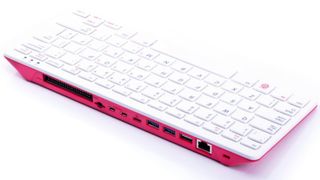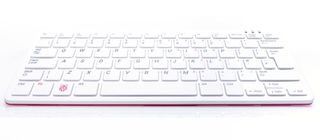Raspberry Pi 400 packs a full computer inside a keyboard
Launches just in time to make it on the Christmas shopping list for all Raspberry Pi fans

The Raspberry Pi Foundation has released the Raspberry Pi 400, its first all-in-one PC, built into a keyboard.
On the face of it, the Raspberry Pi 400 looks like just another bluetooth keyboard. Flip it around though and you’ll notice the ports that you’ll usually find on the sides of your laptop or on the back of a desktop PC.
The keyboard sports a pair of micro HDMI ports that can each output 4K video, two USB 3.0 ports, a single USB 2.0 port, and even an Ethernet port. There’s also a USB-C port for powering the device and it also features a microSD card slot for storage. As usual no Raspberry Pi device is complete with GPIO header for attaching add-on devices known as Hardware-on-Top or HAT.
- Read our review of the Raspberry Pi 4
- Here’s our collection of the best distros for the Raspberry Pi
- These are the best laptops for businesses
After pushing out five major releases of the credit-card sized system-on-a-chip computer, last year's Raspberry Pi 4, sported everything you can expect from a modern computer - a quad-core 64-bit processor, oodles of RAM, wireless networking, dual-display output, and 4K video playback, as well as a 40-pin GPIO header for makers and geeks to plug in additional hardware.
Just plug in a USB keyboard and mouse and a monitor or TV via its HDMI connector and you were good to go.
More than meets the eye
But not everyone has these spare peripherals handy or the skills and the time required to procure compatible ones. Also, along with the cable for the power unit, all the wires could soon get unwieldy.
The Raspberry Pi 400 is designed to overcome all these issues by stuffing all the peripherals into a keyboard.
Are you a pro? Subscribe to our newsletter
Sign up to the TechRadar Pro newsletter to get all the top news, opinion, features and guidance your business needs to succeed!
The Raspberry Pi 400 uses the same Broadcom SoC as found in the Raspberry Pi 4. However, the one in the new keyboard is now clocked at 1.8GHz rather than 1.5GHz as with the Raspberry Pi 4 Model B.
The Raspberry Pi 400 keyboard is available in various regional layouts including UK, and US English, as well as German, French, Italian, and Spanish, and you can expect the devices with layouts for other languages soon.

Power play
The device is available as a kit or as a standalone unit. The kit includes everything but the monitor and costs £94. It comes with a USB-C power supply, a USB mouse, a microHDMI cable, a 16GB microSD card preloaded with Raspberry Pi OS, and the official Beginners Guide.
If you’ve got the USB peripherals, you can just get the Raspberry Pi 400 keyboard for £67. The device also has a slew of compatible accessories, such as a bluetooth mouse and a ribbon cable.
The 40-pin male-to-female ribbon cable will help you attach any of the available HATs for the Raspberry Pi 4.
While the fabricators at the Raspberry Pi foundation have done a fantastic job of integrating the Raspberry Pi 4 inside the keyboard and exposing all the ports. However, the 3.5mm headphone port has fallen victim to the tight squeeze.
The Raspberry Pi Foundation was established in 2008 with the purpose of making computer education more inclusive, driven by its low-cost RaspberryPi computers. In line with that objective, the Raspberry Pi 400 is pitched as the perfect educational tool that’ll appeal to both teachers and learners.
And it couldn’t have come at a better time. The Covid-19 pandemic has forced students around the world to study remotely from home, not all of whom have access to a computer.
- Here are the best laptops for developers
With almost two decades of writing and reporting on Linux, Mayank Sharma would like everyone to think he’s TechRadar Pro’s expert on the topic. Of course, he’s just as interested in other computing topics, particularly cybersecurity, cloud, containers, and coding.

Farewell to screen scratches? Advanced nanocoating technology could be coming to over a million devices

Here's why your smartphone storage is disappearing so fast — popular productivity apps grew 10x in size in a decade, with Asana and Trello the major culprits, but video games remain the biggest data hogs
Most Popular
